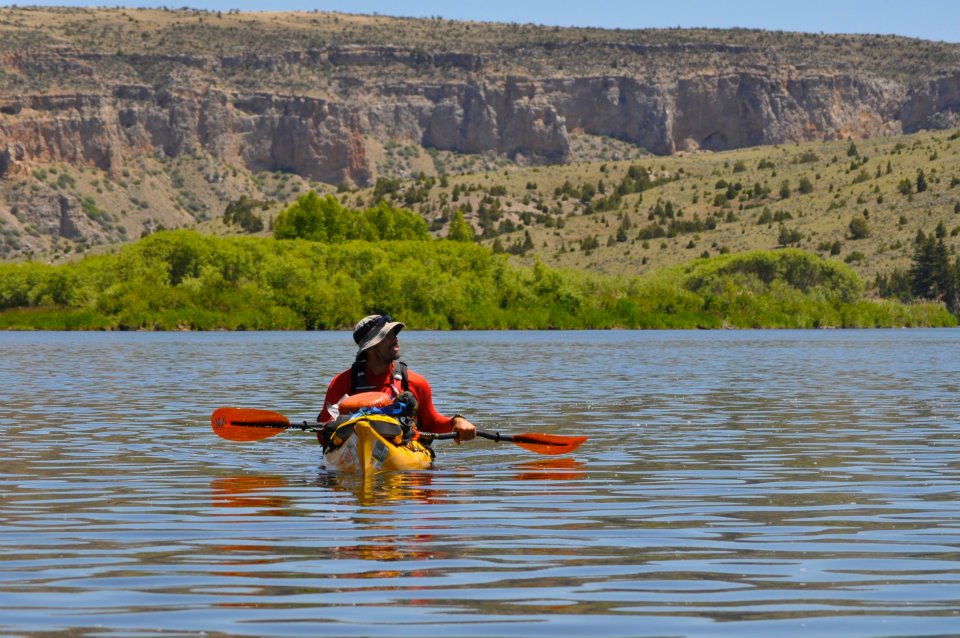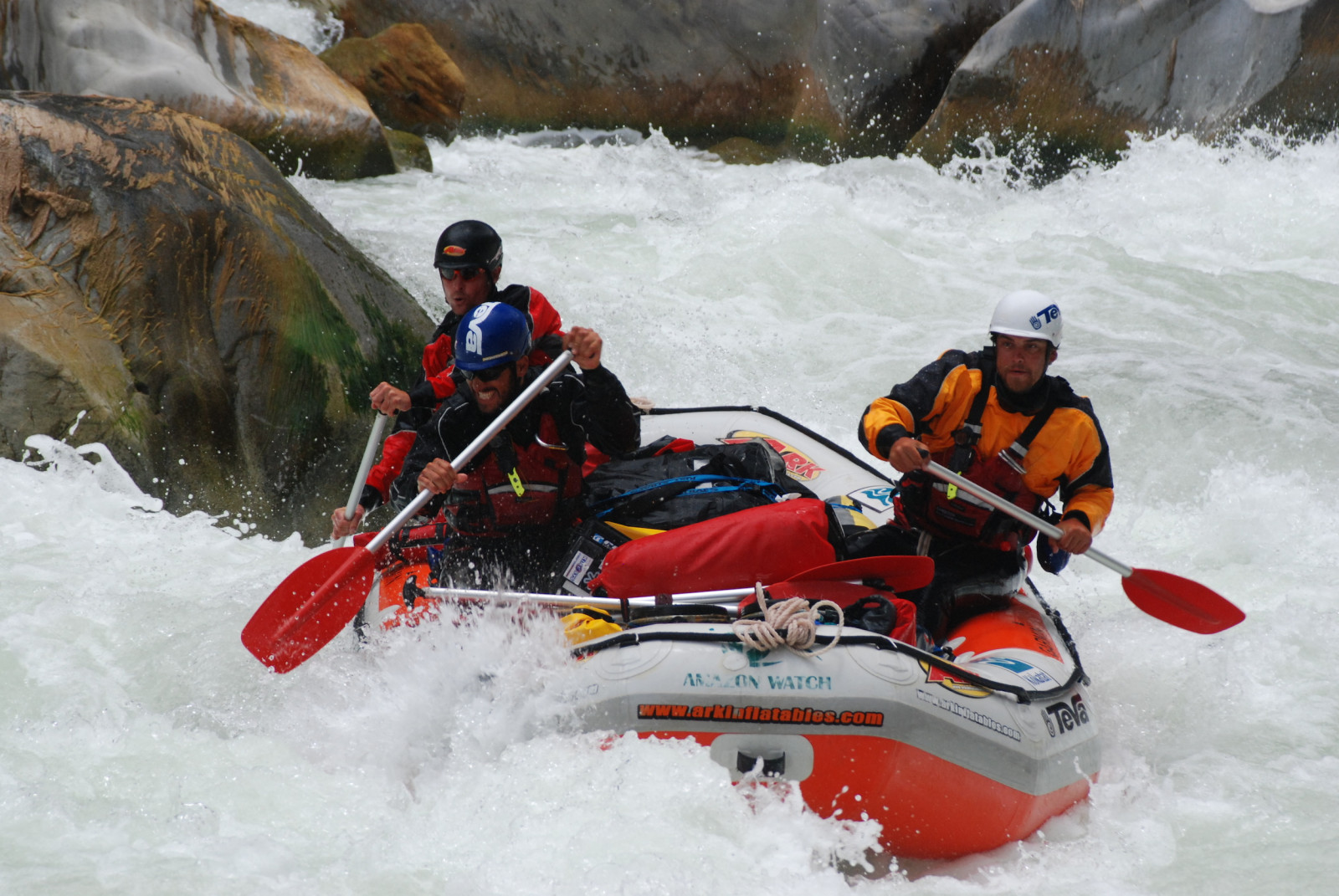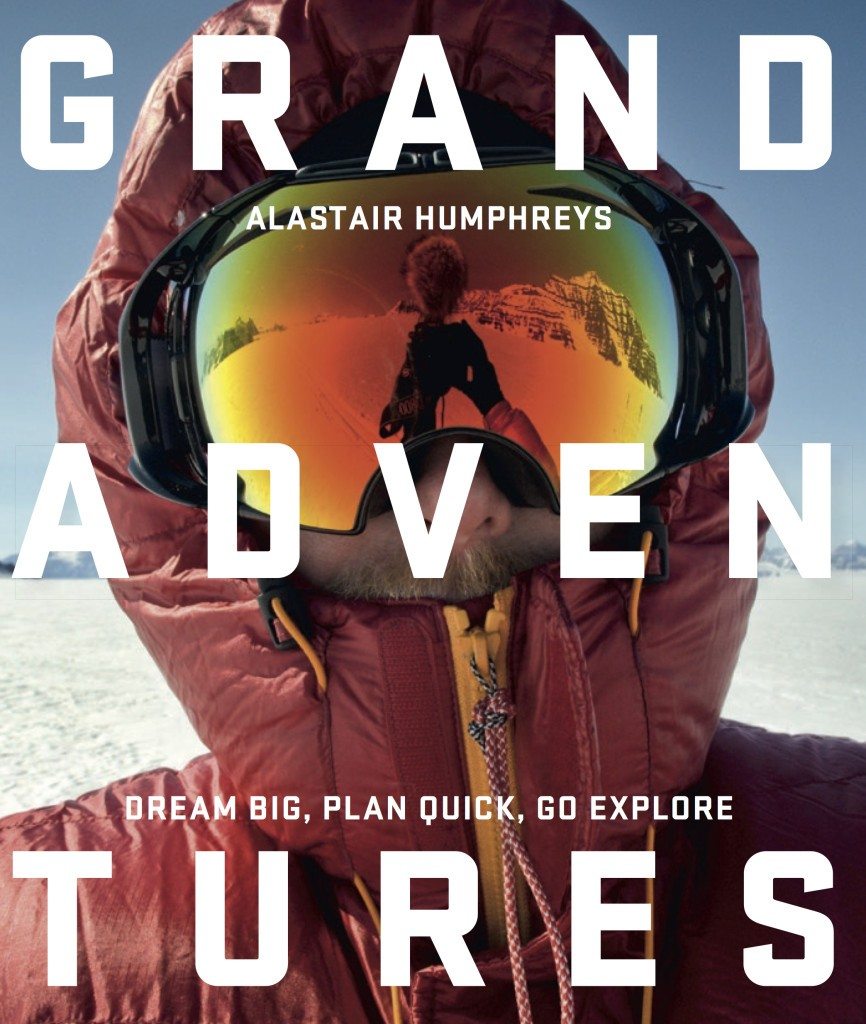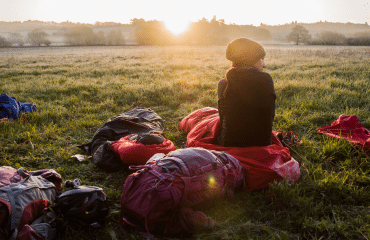Mark Kalch is an Australian expedition paddler currently living in Argentina. He is working on a long-term project to paddle the length of the longest river on all seven continents.
Alastair: Today I am interviewing the adventurer with the biggest muscles in the whole world, Mark Kalch. How did you get such big muscles?
Mark: [laughing] Mostly from paddling, I guess. Or having to lift the kids in and out of the swimming pool would be more likely.
Alastair: Your big river project is the longest 7 Rivers on all 7 Continents. The thing I hadn’t really grasped, which is amazing, is that when you finish you will have paddled 22,000 miles – almost the entire way around the planet. It is a huge undertaking, isn’t it?
Mark: Sometimes I forget that 22,000 miles is sort of a lap around the earth. And when I think of that in terms of paddling, I think, “Yeah that is a long way.” A lot of that isn’t easy paddling. There is a fair portion that is quite difficult going. The project has been so interesting and I am not even halfway yet. I am looking forward to the rest of that 22,000 miles.
Alastair: The three big ones you have done so far are The Volga, The Missouri/Mississippi, and The Amazon. When you think back now, as a sort of generalisation, what were the similarities of those rivers and what were the massive differences?
Mark: The similarities… they are all big rivers and they do literally flow across these continents. I think the differences between the three are pretty stark. The lower Amazon is a super highway for big boats. It still felt quite isolated though, and when you did come across villages, they still live pretty basic lifestyles. There was still this element of isolation. On the Missouri and Mississippi that wasn’t the case. You can pull into a small town and wander up the road and go into the world’s biggest supermarket and find whatever you like or go to a McDonald’s and get Wi-Fi. That isolation wasn’t really there.
Alastair: Is that good or bad?
Mark: It’s just different. As I have done more of these trips, I have become less focused on isolating myself from people. I think both being isolated and being amongst communities can be a good thing.
Alastair: There are lots of different ways people choose to do their adventures. People become specialists in one type of thing or – like me – prefer to be a jack of all trades. Why do you mostly do big river trips? Don’t you get bored?
Mark: I think the reason that I have focused on paddling initially was a bit of a plan. The first proper big expedition that I did was the Amazon. After the Amazon, immediately I thought, “What can I do next?” That’s when I ended up going to Iran and walking across Iran. I finished Iran, which was an amazing experience. Then all too quickly it seems you have to think of the next thing. I was considering maybe I’mll go and climb a big mountain or this and that. My girlfriend, Holly, suggested it might be a good idea to have some sort of focus, instead of just jumping around. It was actually her that suggested paddling the longest river on each continent from source to sea.
Alastair: If Holly suggested the idea, that gives you a license to go away from home and spend huge amounts of time on your trips!
Mark: [laughing] I have to sometimes remind her but I am so lucky. Some friends of hers get upset if their husbands or partners go away for the weekend with their mates up to Wales or something like this, and I get a pass for three, four, or five months at a time – and that’s with having three kids under the age of five. I’mm definitely grateful for that. Sometimes I do have to play the card that it was Holly’s idea, not too often though…
Alastair: I don’t just mean missing your family, but has your attitude to the how you behave out on the journeys changed now that you have kids?
Mark: To a degree. You mentioned the part of missing the kids. I think anyone who has a family, particularly a young family, that’s inevitable. It’s something that if you’re going off to do these trips, that’s certainly just part of it. If you can’t deal with that, you probably have to do something else. In terms of risk taking or anything like that, so far I haven’t had to make too many decisions based on what the result might be as it concerns our young kids. I mean something like the upper Nile, which I’mll have to paddle and the upper Yangtze are two sections of rivers that are ridiculously difficult. They have an element of danger whereby decisions based on how this might affect my kids or my family will certainly have to be taken.
Most of the time I am paddling in nice weather, eating as many chocolate bars as I want to, meeting really cool people and essentially just having a paddling holiday. I really can’t complain at all.

Alastair: I spoke to Lev Wood a while ago about his walk up the Nile and he had to miss a chunk out of that and that was definitely bugging him. What will you do?
Mark: I’mm not sure when the Nile is going to come up in the next few years but that’s something that I’mm going to have to take into account. Luckily for me — and it sort of stuck out for me a lot from when Ed Stafford walked down the Amazon and certainly when Lev just walked the Nile — that being on the river you get past a lot of dangerous things a lot more quickly than when you’re walking. Sometimes if you come up to a village, by the time people who are washing their clothes in the river look up, you’re around the next bend and they don’t have time to react whether they had bad intentions or not. Whereas when you’re walking past a village, there’s plenty of time to stop you and see what’s going on. Maybe that’s to my advantage in terms of paddling.
Alastair: I talked to Ed about this trip. I think his — of all the people I’mve spoken to this year — was really borderline bonkers and doing it for motives that were very familiar to me, a young man thinking, “Screw the world. I want to show you what I can do,” type drive. Now he has achieved something big, I think he feels less the need to prove anything to the world and can start to just do things more for yourself. Where do your motivations lie?
Mark: Initially going to do the Amazon was a chance to do this massive adventure and be sponsored, showing people how hardcore I was and that sort of thing. But now, seven or eight years on, the idea of being this death-defying adventure type person is fairly largely removed from my reasons for doing these things. Anything that I do now is because I want to do it. Choosing these seven rivers, I thought, “Well I can do the longest, biggest, hardest or whatever.” But there is no reason that I couldn’t have said that I was going to paddle the second longest river on each continent. The experiences would have been easily as good or possibly even better.
Alastair: Are you going to be the first to complete it because there’s some other guy trying to do it as well, isn’t there? Does that competitive side add to the excitement for you or take away from the simplicity of the experience?
Mark: It definitely takes away from the experience. To be totally honest, all it does is cause me stress. It weighs on me to think that it feels like there’s sort of a wolf chasing me, so to speak. That’s not a feeling that I like. I just want to go about paddling rivers, not competing. It got me thinking a while back about paddling the second longest river on each continent – maybe I should have gone for that. I could have the same amazing experiences and very little fear of some guy thinking of doing that same project. It’s not an enjoyable feeling.
Alastair: It’s funny, isn’t it? The personal appeal of doing the longest river in each continent is obvious, and it helps for sponsorship and storytelling and stuff. Equally, the second longest or the 17th longest in each continent would be fascinating as well, wouldn’t it? I don’t even know what the second longest river in Africa is or in Europe or Asia, so in that sense it would be almost more interesting.
Mark: Definitely. But I guess it does come back to making a living from paddling. Massively annoyingly: there has to be some sort of hook for sponsors, for media, for people who you might be able to write articles for. Saying that you’ve paddled the second longest or 17th river in some places is just not going to get that attention. If only I was a dot com billionaire, I wouldn’t have to worry about it.
Alastair: Why don’t you just have a normal career, for example be a teacher and then spend the two months each summer doing a big adventure? Why have you tried to make it all into your job?
Mark: Yeah, that’s a good question. Initially I was a bit naive, thinking that I am going to get these sponsors on board. I’mm going to sign contracts with Red Bull and other adventure sports companies and they’re going to pay me enough money on a yearly basis that I can just go off and do these trips! That’s not quite the reality! But the fact of it is that I really enjoy doing it. I guess like any job there are certain aspects that you don’t enjoy, but there’s very little ground to be complaining. For the most part, it is very enjoyable and if you don’t enjoy it that much, go and get another job.
Alastair: I’mm wondering why you do these sort of trips. Is it along the lines of wondering, “What the hell am I doing with my life?” and “I need a big trip to give my life a kick in the butt”?
When you look back on your first big adventure [paddling the Amazon], does that have much impact on your daily life today?
Mark: It does, I think, hugely. If I look at the impact that the Amazon had on the direction of my life, it’s been huge. I’mm a fairly cynical guy, overall, when it comes to motivation because I’mm of the belief that you either do or you don’t do sort of thing.
I don’t think me reading a book or anything like that affects if I’mm going to get off my backside and do something. But certainly having to go through something like the Amazon, the first big trip, which was 153 days of some pretty difficult stuff… There were multiple, multiple times, where I thought we were going to die. I cried more than once, I think twice, to be fair.
Alastair: Twice?
Mark: Yeah, twice.
Alastair: Gosh, that’s a first for an Australian.

Mark: It was two times in one day, actually, but then not after that!
But it did really feel that we went through something that was so ridiculously hard at the beginning and managed to come out the other side. That has to change you in some way. And a big part of that was learning that if you don’t do something, if you don’t get up and do it, then it’s not going to happen.
We sat above these rapids after we made camp at night, and it was just so loud. And even when it turned pitch black, they’re so loud that you can’t hear anything else. Either side are these steep canyon walls, which even if you had climbing gear, there’s no way to climb out of. And so you’re faced with the fact that to get out of there and to live, you’re going to have to run this rapid. If you don’t do it, you can stay here and die. Or you can do it and then see what happens when you come out the other side.
That is not to say that, now, I don’t sit in my air-conditioned apartment in Buenos Aires and get distracted by stuff on the internet and not get anything done!
I’mve learned to formulate a plan, to get these expeditions done. Such a big part of it is in the planning. Once you’re walking across Iran, once you’re on a river, it’s actually easier. But getting off your backside and doing it in the first place is the biggest part of it. If you can get that done, you’re on your way.
Alastair: One of the things that puts me off doing a big river journey is the hassle of the logistics: getting to the start and getting away from the finish.
Mark: You probably hit the nail on the head there. Those stages can be a bit of a hassle. But again, if you’re planning is pretty good, then you get away with it.
For the Volga I was really lucky that I had a craft from a boat sponsor already waiting for me in Moscow. It’s a 17-foot kayak. So putting that on a plane can be a bit of a hassle.
Alastair: You should be mentioning the name of your boat sponsors, at all times!
Mark: Okay. Do you mean P & H Custom Kayaks, the best kayaks in the world?
Alastair: “When I paddle Rivers, I always use P & H Custom Kayaks.”
Mark: Yeah, the best by far! So I was really lucky in that way. But still the source of the Volga was a four-hour, hair-raising car ride away. So eventually through friends, or friends of friends, or a brother of a friend, I managed to get there in an old Russian car with the kayak strapped to the roof. And then, all of a sudden, I was there.
Alastair: Is it possible to do a big river paddling journey cheap?
Mark: Yeah, yeah. I think so. It really depends on the nature of the river. The Volga is essentially a flat water river from start to finish. So you could pick up a second-hand kayak in Russia, a canoe, whatever for very cheap and do it on that. You can get ridiculously cheap camping gear these days. Probably the most expensive thing might be your safety gear, and that’s something that you shouldn’t try and save too much money on.
I would definitely encourage anyone, if they have an inkling, to get on the Volga. It’s just a beautiful river, and the people were ridiculously friendly.
But then something like the Nile or the Yangtze or the Amazon, the upper sections, it’s a different story. You have to have the exact gear for those journeys and know how to use it. If you turn up with a really old boat, old gear, it certainly doesn’t increase your chances. Your chances are pretty slim, as it is, with the best gear!
Alastair: If I gave you £1000 for an adventure, what would you go and do with that?
Mark: I think I could do this, including airfares, including pretty much everything. And I apologize because obviously I have been influenced massively by my Russian adventure, my first visit to Russia.
I could get a flight from the UK to Moscow very cheaply. I would jump on a train from Moscow and get a fair way across the country. All I’md have with me, I think, is a big pack, a packraft or a really cool new boat coming out from AIRE called the Bakraft, which is their portable boat, which handles really difficult whitewater.
And then my aim would be to get back to Moscow using my feet and this boat. The countryside is so diverse. The terrain that you would cross would just be so amazing, and the people that you would come across are equally as amazing. And I’mm pretty certain I could get back to Moscow for well under £1000, well under.
Alastair: Thank you.
Follow Mark’s challenge online here.
My new book, Grand Adventures, is out now.
It’s designed to help you dream big, plan quick, then go explore.
The book contains interviews and expertise from around 100 adventurers, plus masses of great photos to get you excited.I would be extremely grateful if you bought a copy here today!
I would also be really thankful if you could share this link on social media with all your friends – http://goo.gl/rIyPHA. It honestly would help me far more than you realise.
Thank you so much!
Grand Adventures from Alastair Humphreys on Vimeo.





Comments